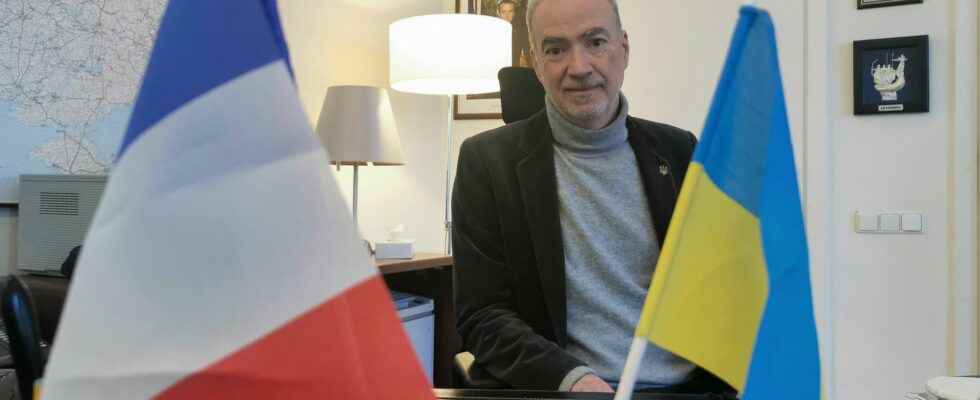From the top of his eighty-nine meter – like one of his mentors, Valéry Giscard d’Estaing -, Etienne de Poncins overlooks many of his interlocutors. Convenient to be seen in the photos. The French ambassador to Ukraine does not miss an opportunity to share pictures of him “in action” on Twitter. Arrived in Kiev in 2019, four months after the election of Volodymyr Zelensky, the diplomat is in the front row during the rise of the ex-comedian, then his metamorphosis into a warlord. And the French emissary wasted no time in drawing inspiration from the Ukrainian communications maestro. “Communication, I feel it immediately, will become, over the days, a real challenge, he confides in In the heart of the war (XO ed., 2022). Feeling the squall rise, the message I keep hammering home is that of an embassy at work.”
The stakes are eminently political because, more than once, France has been singled out for its weak participation in the war effort in Ukraine. The Elysée Palace has nevertheless beefed up the financial and military support promised to kyiv. Its overall assistance – including the envelope paid via the European Union – amounts to 7.4 billion euros, in third place behind the United States (47.8 billion) and Germany (12.6 billion ), according to the Kiel Institute for the World Economy.
A convinced pro-European
“On a daily basis, our ambassador coordinates the deployment of humanitarian action from France to Ukraine”, underlines the Quai d’Orsay. Etienne de Poncins wants to be himself the champion of this “diplomacy from the first to the last kilometer”. From Mariupol to Kharkiv via Izioum, he travels the country, meets the mayors, accompanies convoys of food and reconstruction material.
Close to Foreign Minister Catherine Colonna – he was her chief of staff in her first ministerial post, under Jacques Chirac – the 58-year-old diplomat, who passed through Bulgaria and Poland, and married to a Pole, is a pro-European convinced. “He had understood before many others in France that Ukraine was a country essential to European balances, under an existential threat from the Russians”, underlines Renaissance MP Anne Genetet, elected from the 11th constituency of French people living abroad, who met him there in 2019.
“His participation in 2002 in the European Convention with Valéry Giscard d’Estaing, during the writing of the draft Constitution, marked him a lot, says Benoît d’Aboville, former ambassador to Poland, of whom de Poncins was the number 2. His knowledge of Central Europe made him a valued diplomat in Kiev, even before the conflict.This certainly allowed him to maintain ties, including in times of turbulence, when Emmanuel Macron wanted at all costs to keep dialogue with Moscow.” Benoît d’Aboville describes his ex-collaborator as a “calm and balanced” man.
An ambassador criticized
However, the ambassador is not unanimous. His management and the management of the evacuation of kyiv, under the bombs, on February 28, were criticized in the press. Several employees regret an ill-prepared departure and evoke a chef locked up in his ivory tower. The publication of his book in November was not appreciated by all at the Quai either. Etienne de Poncins describes himself as “the captain of a ship, that of the Embassy, which faces the most furious of storms, that of war.” “Contrary to what I might have thought, the weight of responsibility does not weigh particularly heavily on me. I have no doubts about my ability to cope with it,” he continues. “The ‘phlegmatic British under the Blitz’ side has annoyed some colleagues,” slips a source in Paris.
In kyiv, a former embassy agent also regrets diplomatic management in an ultra-restricted committee. “Since the beginning of the war, the scientific and cultural cooperation team has been practically dismantled, he explains. The result is visible: many cultural events are organized with the support and the logo of the Institute Goethe, German. The Institut français is an absent subscriber.” Faced with a war that is set to last, Paris favors military and humanitarian emergency. Because “in the end, Ukrainian freedom must triumph, concludes, in his book, the ambassador. As the Gaullist resistance triumphed against Nazi Germany.”
